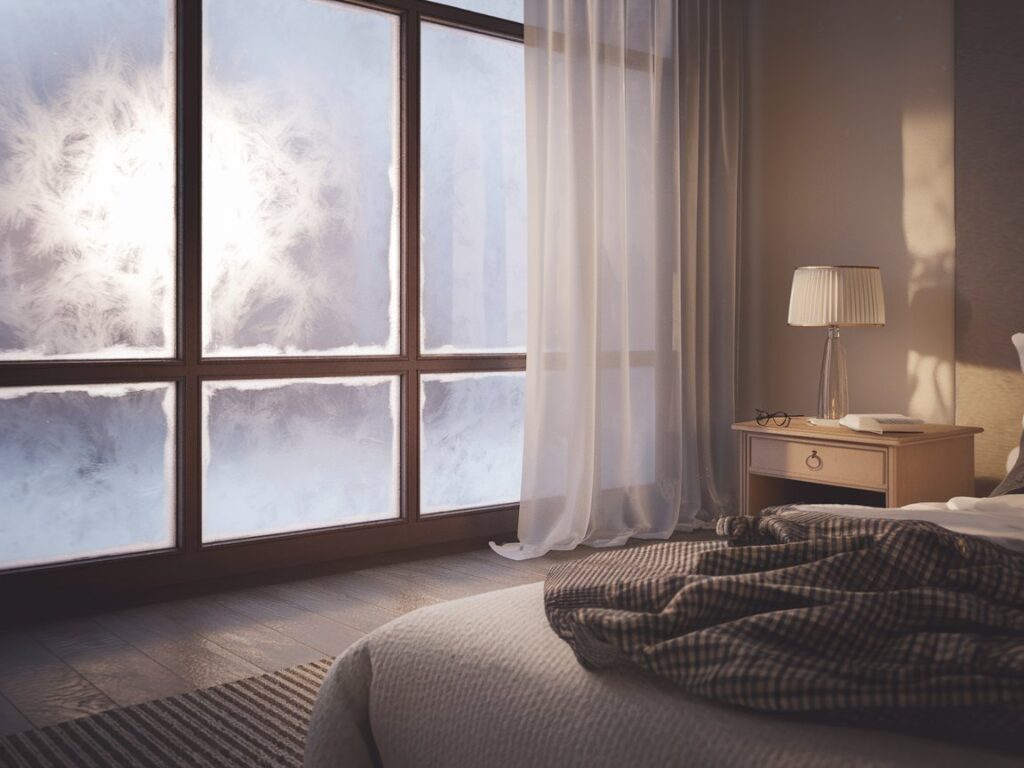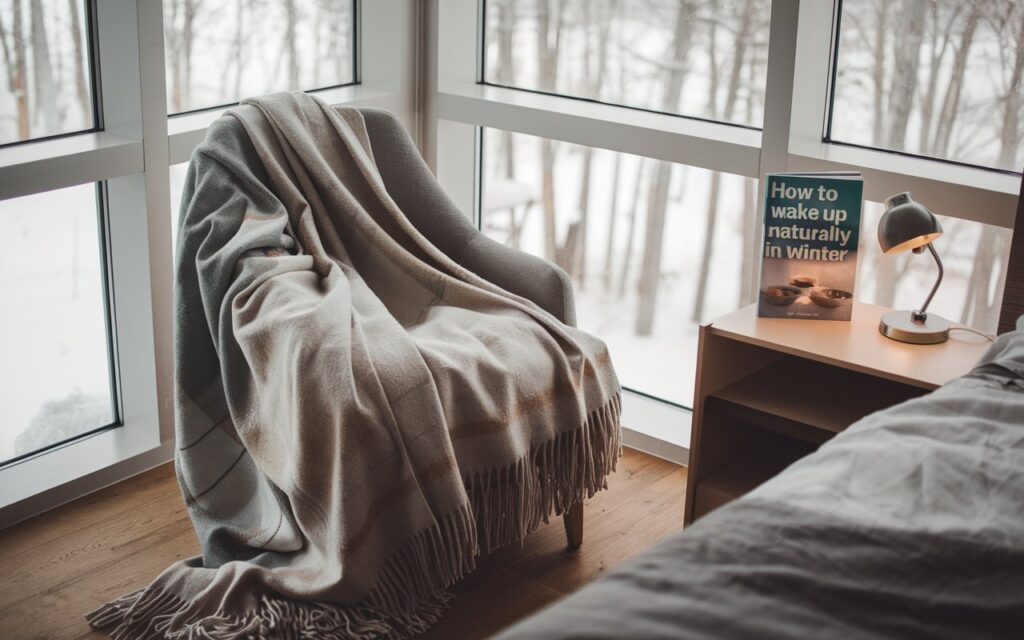Waking up naturally in winter can be hard. Less sunlight affects our energy and mood.
In winter, days are shorter, and mornings are often dark. This makes it hard to feel energized or even awake.
But there are ways to rise naturally, even with less sunlight. I’ve learned several tricks over time.
With a few changes, waking up can feel easy and natural, even in winter. I’ll share my best tips to help you rise without struggle.
Make the most of the daylight
Winter has limited daylight. So, maximizing it can boost our morning energy.
Start by opening your curtains and blinds early. Letting in any morning light can help our bodies adjust to daytime.
If you have access to sunlight, try to step outside. A short walk or some fresh air can give you a boost.
I often take a quick morning walk when it’s sunny. It’s refreshing and helps me feel awake.
Another way to use daylight is through light therapy lamps. These mimic natural sunlight and can brighten your mornings.
Light therapy is easy to add to a morning routine, especially on cloudy days.
I set mine on my desk and read or stretch by it for 15-20 minutes.
Using daylight effectively makes mornings feel more natural and pleasant, even when the sun is scarce.
Read More: Wake Up Early Without an Alarm: 7 Tips for a Refreshing Morning Routine

Turn lights on automatically
Automatic lights are very helpful in winter. They can gradually light up your room before your alarm.
When the room is already bright, waking up feels less harsh. Automatic lights help recreate a sunrise effect indoors.
Many smart lights have a wake-up feature. They start dim and get brighter over time.
This gentle light cue is a natural wake-up signal, even on dark mornings. I love how it feels like a soft sunrise just for me.
Here’s a simple table comparing types of lights for waking up:
| Light Type | Features | Pros | Cons |
| Smart Lights | Gradual light increase | Mimics sunrise, easy setup | Needs app or smart device |
| Light Therapy Lamps | Brightens mood and energy | Effective on cloudy days | Needs space and power outlet |
| Standard Timer Lights | Fixed light on/off times | Affordable | No gradual brightness increase |
Adding automatic lighting can make a huge difference in your morning mood. You feel more awake and alert without a loud, shocking alarm.

Hot tea in the morning
Hot tea is comforting in the morning. The warmth helps your body wake up gently.
I prefer herbal teas like peppermint or ginger. They are both refreshing and soothing, perfect for chilly mornings.
Tea also gives a small caffeine boost without the strong effects of coffee.
The ritual of making tea, sipping it, and feeling its warmth helps you start the day in a relaxed way.
You can also try different types of teas based on your energy needs. For example:
| Tea Type | Benefits | Best for |
| Green Tea | Light caffeine boost | Gentle energy, antioxidants |
| Peppermint Tea | Refreshing and soothing | Calming mornings, clear focus |
| Ginger Tea | Warms body, aids digestion | Cold mornings, gentle wake-up |
Adding a morning tea ritual can make winter mornings something to look forward to.
Vitamin B-12
Vitamin B-12 is essential for energy. It can support mood, focus, and wakefulness. If you struggle to wake up, this vitamin might help.
B-12 is available in many foods, like eggs, fish, and dairy. If you’re low on B-12, adding more to your diet can be beneficial.
I take a small B-12 supplement on days I need extra energy.
A balanced diet that includes B-12-rich foods can improve overall mood and energy. For a quick view:
| Food Source | Vitamin B-12 Content |
| Eggs | 0.6 mcg per egg |
| Salmon | 4.9 mcg per 3 oz serving |
| Beef | 1.5 mcg per 3 oz serving |
Adding B-12 to your routine helps maintain steady energy, even on darker winter mornings.

Change your wake-up sound
Switching up your alarm sound can change your wake-up experience.
A harsh alarm feels jarring, especially in winter. Instead, try a gentle melody or nature sounds.
Many alarm apps have calming tones. My favorite is a soft bird song sound.
It feels like nature, helping me wake up without stress. You can also try music that makes you feel positive.
Different sounds work for different moods.
Consider setting your alarm sound based on what feels right for you.
A gentle sound makes waking up in winter much easier and more pleasant.

Plan the next day
Planning your day the night before can ease morning stress. When I know my tasks, I wake up with a clear plan.
This makes mornings feel smoother and less overwhelming.
I write a quick to-do list each night. It includes my top tasks and any items I need to remember. Having this ready gives me a focused start.
You can also prepare items you need, like clothes or breakfast ingredients.
Small prep steps make mornings feel less rushed. A clear mind and plan make waking up a better experience.

Place alarms around the room
If you hit snooze often, try placing alarms away from the bed.
Alarms across the room make you get up to turn them off. Moving around helps you feel awake faster.
I use two alarms in my room. One is close by, and the other is farther away.
The second alarm forces me to stand and move, which wakes me up. This setup keeps me alert, even on winter mornings.
Try placing an alarm in another part of the room to start your day actively. This small change reduces snoozing and makes mornings easier.
Mindfulness and Presence
Practicing mindfulness in the morning can bring calm.
Mindfulness helps you focus on the present, which eases morning stress.
Winter mornings often feel slow, and mindfulness can support a gentle start.
Simple breathing exercises can help. I take a few deep breaths while still in bed.
Focusing on each breath centers my mind and body. Some people also enjoy morning stretches or short meditation sessions.
Mindfulness sets a calm tone for the day. It helps you wake up feeling peaceful and grounded.
A present mind can ease the winter morning struggle.

Increase the room temp at wake-up time
A warm room makes getting up easier. Winter mornings feel cold, and this can make staying in bed tempting.
Adjusting your room temperature before waking up makes a big difference.
If you have a programmable thermostat, set it to warm up your room around your wake-up time.
The gradual warmth signals your body that it’s time to start moving.
I set my room’s temperature to increase about 15 minutes before my alarm.
Waking up in a cozy room feels more inviting than a cold one. It’s a small change that can make winter mornings more comfortable.
Personal Story
In winter, I found myself struggling to wake up naturally.
I used to feel groggy and tired, dreading the alarm each morning. Gradually, I started making small changes.
I set my smart lights to turn on before my alarm. I also started having a cup of hot peppermint tea as soon as I woke up.
These changes were simple but effective. Now, my winter mornings feel smoother, and waking up feels natural.
I enjoy the calmness of my routine, and I’m ready for each day.

FAQs About Wake Up Naturally in Winter
Key Takeaways
- Small changes make a big difference.
- Focus on adding light and warmth.
- Prepare the night before for easier mornings.
Waking up naturally in winter takes a bit of planning. But with the right steps, you can rise feeling refreshed and ready.
Adjusting light, temperature, and sounds can make mornings feel natural, even with less sunlight.
What’s your go-to morning trick for winter? Try a few of these tips and see how they work for you.




